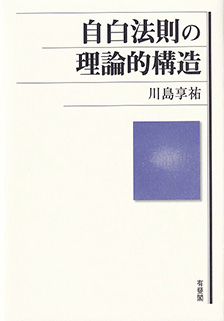
Title
Jihaku Housoku no Rironteki Kouzou (Theoretical Structure of the Confession Rule)
Size
672 pages, A5 format, Hardcover
Language
Japanese
Released
April, 2022
ISBN
978-4-641-13953-4
Published by
Yuhikaku
Book Info
See Book Availability at Library
Japanese Page
This book is a monograph based on a dissertation I wrote as an assistant professor at the University of Tokyo Graduate Schools of Law and Politics. Article 38, paragraph 2 of the Japanese Constitution, and Article 319, paragraph 1 of the Code of Criminal Procedure (CCP) provide the exclusionary rules of confessions, which are collectively referred to as “the confession rule” in Japan. This book examines fundamental questions related to the theoretical structure underlying this rule, including what the rationale for excluding confessions should be, what approach we should take to construct the theoretical structure of the confession rule, and whether the concept of voluntariness should be regarded as a comprehensive criterion for the rule.
This book explores these issues from both historical and comparative approaches. With regard to the former, it traces the history of the confession rule from its origin in England to contemporary Japan, where this rule has been codified. With regard to the latter, it investigates how the theoretical structure underpinning the confession rule and similar rules is understood in other countries. Although these two approaches have traditionally been used in the field of law, I believe that I have successfully taken the conventional understanding of the confession rule one step further by using historical and comparative findings from my research.
Historically, the origin of the confession rule is traceable to late 18th-century England. Its original rationale was the reliability principle, based on which potentially false confessions are excluded from evidence to prevent a mistrial by the jury. The confession rule supported by the reliability principle also took root in various jurisdictions in the United States. In the first half of the 20th century, however, the U.S. Supreme Court began to apply the Due Process Clause of the 14th Amendment to the U.S. Constitution to invalidate state convictions that were based on confessions procured through cruel interrogation techniques such as torture (the so-called “third degree”). Obtaining confessions through extremely abusive interrogation tactics was also a grave social problem in prewar Japan. Article 38, paragraph 2 of the Japanese Constitution, and Article 319, paragraph 1 of the CCP were adopted immediately after World War II under the strong influence of the General Headquarters, the Supreme Commander for the Allied Powers (GHQ/SCAP), which had occupied Japan and was led mainly by the U.S.
Taking into account the above historical background, this book contends that the Japanese confession rule is composed of the following three rationales. First, Article 38, paragraph 2 of the Japanese Constitution requires the exclusion of confessions obtained by extreme, abusive interrogation tactics such as torture. Second, the same provision also commands that confessions procured by the infringement of one’s freedom to make a statement be excluded in terms of protecting the privilege against self-incrimination, which is guaranteed by the Fifth Amendment to the U.S. Constitution and also incorporated into the Japanese Constitution. Finally, the reliability principle is embodied in Article 319, paragraph 1 of the CCP, and potentially false confessions may not be admitted as evidence pursuant to this provision.
From a comparative perspective, this book identifies three approaches to constructing the theoretical structure of the confession rule: the single-rational approach, the holistic approach, and the individualized-deductive approach. The single-rationale approach is adopted in Germany, where the infringement of the freedom to make a statement is the only criterion for excluding confessions. The U.S. and Canada embrace the holistic approach, under which the confession rule requires trial judges to consider multiple rationales comprehensively under the concept of voluntariness. The individualized-deductive approach is used in contemporary English and Australian law. Under this approach, the frameworks for judging the admissibility of confessions should be deduced directly from the respective rationales underlying the confession rule, and it is considered that the concept of voluntariness be abolished as a criterion for the confession rule, since it is vague and meaningless.
This book argues that while Japanese law has adopted the holistic approach, it should construct the theoretical structure of the confession rule based on the individualized-deductive approach in order to build a structure that is more transparent and stable. Following this approach, this book asserts that the concept of voluntariness should not be used as a comprehensive criterion for the confession rule. Finally, it specifies frameworks for judging the admissibility of confessions, which are respectively deduced from the three rationales mentioned above.
(Written by: KAWASHIMA Kyosuke / September 05, 2022)
Related Info
The 2nd UTokyo Jiritsu Award for Early Career Academics (The University of Tokyo 2021)
https://www.u-tokyo.ac.jp/ja/research/systems-data/n03_kankojosei.html



